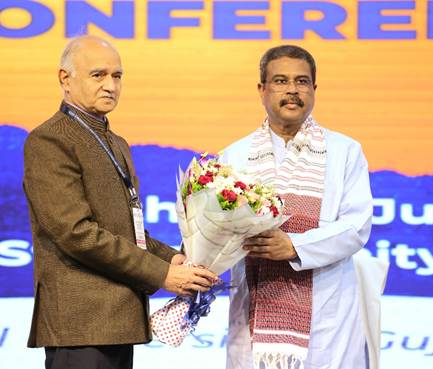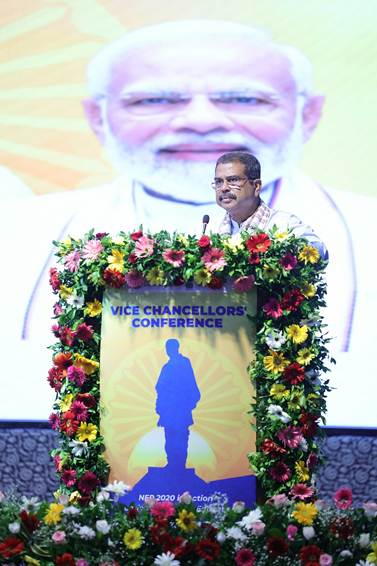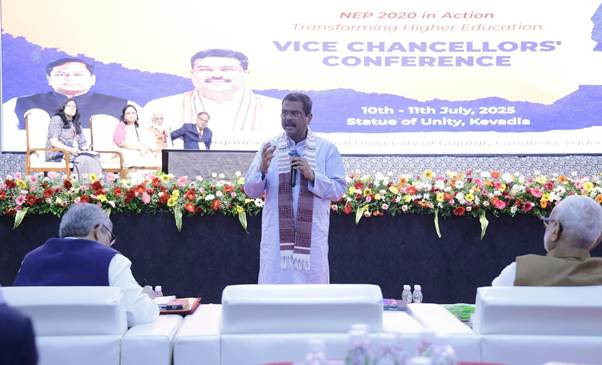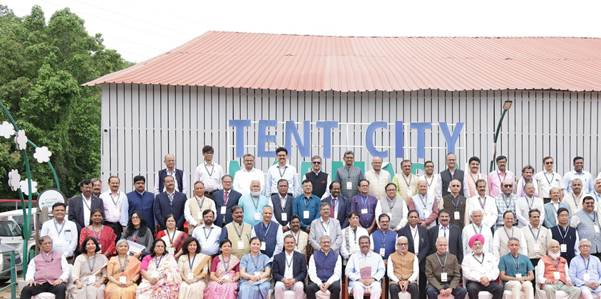Ministry of Education
Panch Sankalpa of NEP 2020 to be the guiding principle for HEIs: Dharmendra Pradhan
Government aims to raise GER in Higher Education to 50% by 2035: Dharmendra Pradhan
NEP 2020 Promotes Students-First Approach as they are our national strength
Each university to prepare strategy paper to achieve the vision of Viksit Bharat: Dharmendra Pradhan
Shri Dharmendra Pradhan inaugurates the Vice Chancellors Conference at Kevadia
First day discussions focus on the Foundational Reforms to Accelerate NEP 2020 Implementation
Posted On:
10 JUL 2025 2:45PM by PIB Delhi
The Two-day Vice-Chancellors’ Conference of Central Universities commenced today at Kevadia, Gujarat, with the participation of more than 50 Vice Chancellors of leading higher education institutions to review, assess, and strategize the implementation of NEP 2020 since its inception. Organised by the Ministry of Education in collaboration with the Central University of Gujarat, the meeting aims to consolidate and map the institutional progress of central universities in mapping up the vision of Viksit Bharat 2047.

Speaking on the occasion, Union Minister of Education Shri Dharmendra Pradhan said in the last decade, India’s higher education ecosystem has undergone a fundamental transformation making it flexible, interdisciplinary, inclusive and innovation driven. Shri Pradhan mentioned as a result, total student enrolment has touched 4.46 crore, a 30% increase since 2014–15, female enrolment has grown by 38%, and female GER now exceeded male GER, Ph.D. enrolment has almost doubled, and female Ph.D. scholars have grown by 136%, GER for Scheduled Tribes has increased by 10 percentage points, for SCs by over 8 points. This indicated the Government’s commitment to inclusive education and social justice. He also mentioned that as a result of positive policy initiatives 1,200+ universities and over 46,000 colleges have been established making India of one of the largest systems globally.

During his address, Shri Pradhan highlighted the concept of Panch Sanklapa of NEP 2020 which would be the guideline for the VCs in their university gurukuls. The prominent themes being Next-Gen emerging education, Multidisciplinary education, Innovative education, Holistic education and Bharatiya Education. The Minister called upon the VCs to devise changes to implement the objectives of the academic Triveni Sangamam through the following objectives- Celebrating the past (India’s richness), calibrating the present (India’s narrative correction), and creating the future (India’s role in the global order). This would ensure understanding the past, uncovering the present and unfolding the future in the contemporary framework.

The minister emphasised that it was important to raise the GER in higher education to 50% by 2035 by taking definitive actions in critical areas such as redesigning curricula, building digital systems, training faculty and promoting multidisciplinary approaches. For attaining this objective, it was imperative for the Vice Chancellors to act as catalysts in shaping the mind-set and aspirations of students. Shri Pradhan emphasised that universities must follow “Students-First” approach, students should be the centre of all our reforms as they constituted the core of our national strength for the future. He called upon the Vice Chancellors to ensure that the institutions being built for the future where skilled and future ready to promote ready work force and students were empowered to be job creators, social entrepreneurs and ethical innovators.

During the course of his address, the minister called upon the participants of the meeting to prepare a strategy paper for a full implementation of NEP 2020 for Implementation of NEP 2020 in every university. It should include: multidisciplinary integration of subjects, mainstreaming Indian Knowledge System (IKS), devising strategies for tech driven education to promote skilling and up-skilling, campus initiatives focusing on innovation and integration of technology with traditional values and conferences like VC’s conference should be organised in the individual university campuses.
Dr. Hashmukh Adhia, Chancellor, Central University of Gujarat, in his address outlined comprehensively the “Six Principles” of karmayoga and emphasised the role and importance of Indian Knowledge Systems in the lives of individuals, society and the nation. He called upon the participants to practice the principles in achieving their goals and objectives in life.
In his opening remarks, Dr. Vineet Joshi, Secretary, Higher Education, said as we complete five years since the launch of the National Education Policy 2020, this conference provides us with an opportunity to reflect on our progress and refine our roadmap towards achieving the vision of a holistic, multidisciplinary, and globally competitive higher education system. He also noted the NEP 2020 laid out an ambitious, yet achievable, vision for India’s higher education system—rooted in accessibility, equity, quality, affordability, and accountability. It reimagines our institutions not as degree-granting bodies, but as ecosystems of innovation, critical thinking, research, and holistic development.
Dr. Sunil Barnwal, Additional Secretary, Higher Education in his address highlighted the role and importance of the five foundational pillars of NEP 2020 namely Access, Equity, Quality, Affordability and Accountability. He also emphasised the important role of stakeholder partnership of higher education institutions in taking forward the goals of NEP.
Prof. Rama Shanker Dubey, Vice Chancellor of Central University of Gujarat in his address at the conclusion of the inaugural session mentioned that all Central Universities would take proactive steps to implement the vision of Viksit Bharat through their individual campuses.
The discussions over the two days are expected to broadly cover three key areas:
1. Strategic Alignment: To ensure that Central Universities are aligned with the policy’s next-phase goals.
2. Peer Learning and Knowledge Exchange: To foster dialogue among academic leaders on institutional innovations, enabling environments, and shared challenges.
3. Forward Planning and Readiness: To prepare institutions for upcoming policy milestones, regulatory transitions, and the global academic landscape of 2047.
The conference will cover key aspects of higher education – teaching/ learning, research and governance through ten thematic sessions spread over the 2 days aligned with the key pillars of NEP 2020 —Equity, Accountability, Quality, Access and Affordability. These include:
1. Understanding and Implementation of NHEQF/NCrF with focus on Four-Year Undergraduate Programme (FYUP)
2. Future of Work – Alignment of Courses as per the requirement of future of Job Role
3. Digital Education – SWAYAM, SWAYAM Plus, AAPAR with focus on Credit Transfer
4. University Governance System - SAMARTH
5. Promotion of Equity in HEIs- Fostering an Inclusive and Equitable Environment.
PM Vidya Lakshmi, One Nation One Subscription
6. Education in Bhartiya Bhasha and Indian Knowledge System, Bhartiya Bhasa Pustak Scheme
7. Research and Innovation including ANRF, CoE, PMRF
8. Ranking and Accreditation System
9. Internationalisation including Study in India
10. Faculty Development - Malaviya Mission Teacher Training Programme
Some of the participating institutions include the University of Delhi, Central University of Haryana, Assam University, Hemvati Nandan Bahuguna Garhwal University, Central University of Rajasthan, Central University of Kashmir, Visva-Bharati, National Sanskrit University, Indira Gandhi National Tribal University (IGNTU), Sikkim University, Tripura University, Jawaharlal Nehru University (JNU), University of Allahabad, and many others.
NEP 2020 lays out a clear vision for transforming India’s higher education landscape, it envisions vibrant, multidisciplinary institutions that encourage inquiry, collaboration, and global engagement. In alignment with this vision and to build synergies between different stakeholders, the Vice Chancellors’ Conference is expected to generate meaningful insights, strengthen collaboration among institutions, and help chart a clear roadmap for the next phase of NEP 2020 implementation. The outcomes of this conference will play a key role in shaping the future of higher education in India and advancing the nation’s collective vision of becoming a Viksit Bharat by 2047.
The inaugural day will feature discussions on six thematic sessions centered on strengthening the pillars of India’s higher education ecosystem, Academic mobility, aligning teaching & learning with Future of Work, skill alignment, digital education, university governance systems, Equity in higher education and integration of Indian Knowledge Systems.
****
MV/AK
MOE/DoHE/10 July 2025/34
(Release ID: 2143690)
Visitor Counter : 1363
Read this release in:
Gujarati
,
Urdu
,
हिन्दी
,
Marathi
,
Manipuri
,
Bengali-TR
,
Bengali
,
Punjabi
,
Odia
,
Tamil
,
Kannada